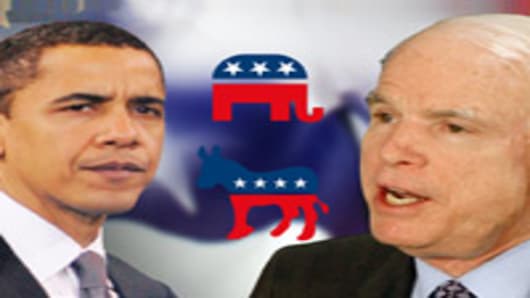John McCain announced Friday morning he would show up for Friday's scheduled debate against Barack Obama, a widely anticipated showdown that had been cast in doubt by U.S. financial chaos and extraordinary political maneuvering.
Earlier in the week, McCain said he would skip the debate in Oxford, Mississippi, so he could work with President George W. Bush and congressional leaders on a plan to rescue the U.S. financial system.
Watch the debate on CNBC beginning at 9 p.m. ET.
But talks on a $700 billion rescue plan stalled after a White House meeting called by Bush with congressional leaders as well as the two presidential candidates collapsed on Thursday into rancorous disagreement.
Democrats on Friday blamed House Republicans for turning on Bush—and supporting McCain—in an effort to get the bailout package rewritten.
Rep. Barney Frank, chairman of the House Financial Services Committee, said leading Democrats on Capitol Hill were shocked by the level of divisiveness that surfaced at the White House meeting, which occurred after key congressional players of both parties thought they had bipartisan agreement on the broad outlines of a bailout bill.
"I didn't know I was going to be the referee for an internal GOP (Republican) ideological civil war," Frank, a Massachusetts Democrat, said on CBS's "The Early Show."
The disagreements were so deep-seated that some lawmakers wondered aloud just who—and how many—negotiators would show up for the resumption of talks later Friday morning at the Capitol.
Obama, speaking in a round of television interviews after the meeting with Bush, said he hoped McCain will go ahead with their debate, saying on CNN: "My sense is that we can do more than one thing at a time."
The debate was to be the first of three and comes as the candidates are locked in a tight race. Most polls have shown Obama, a first-term Democratic senator seeking to become the first black president, tied or with a slight lead over McCain, a longtime Republican senator and former Vietnam prisoner of war.
McCain's call to postpone the debate was his latest surprise move aimed at shaking up a race in which Obama would seem to have an inherent advantage, given the economic turmoil and the unpopular Bush presidency.
McCain was looking to cast himself as a bold leader, willing to set aside politics and put the needs of the nation first in a time of crisis.
"I understand how important this debate is and I'm very hopeful," McCain said late Thursday. "But I also have to put the country first."
Still, his stance could backfire if he is seen to be grandstanding on the financial bailout program while the U.S. economic situation deteriorated.
As the debate continued in Washington, one of largest banks in the U.S.—Washington Mutual—collapsed under the weight of its enormous bad bets on the mortgage market.
The Federal Deposit Insurance Corp. seized WaMu on Thursday, and then sold the saving bank's assets to JPMorgan Chase for $1.9 billion.
Seattle-based WaMu, which was founded in 1889, is the largest bank to fail by far in U.S. history. Its $307 billion in assets eclipse the $40 billion of Continental Illinois National Bank, which failed in 1984, and the $32 billion of IndyMac, which the government seized in July.
Democrats charge that McCain is undermining bipartisan efforts to resolve the financial crisis by making them part of the presidential campaign.
The four-term Arizona senator did not, in fact, truly suspend campaign activities nor, Democrats claim, did he carry through on a promise to halt TV ads attacking Obama. McCain's running mate, Alaska Gov. Sarah Palin, paid a highly visible visit to memorials in lower Manhattan to those killed in the Sept. 11, 2001, terror attacks.
Obama's campaign derided McCain's claim to have halted activity as a political stunt.
"John McCain hasn't suspended his campaign, he only wants us to suspend disbelief," spokesman Bill Burton said in a statement.
Democrats in Congress were outraged over the collapse of the bailout deal, which they blame firmly on Republicans. And some blame McCain himself.
"What we have right now is total chaos brought by injecting presidential politics into very serious negotiations," New Mexico Gov. Bill Richardson, a Democrat, said on NBC.
Asked Friday whether an agreement appeared likely by the end of the weekend, Frank said: "It's up to the House Republicans and their war, I think, on behalf of Sen. McCain, with President Bush."
"John McCain did nothing to help," said Senate Majority Leader Harry Reid, who attended the White House meeting. "He only hurt the process."
Sen. Chris Dodd, the Democratic chairman of the Banking Committee, said McCain was grandstanding and trying to reverse his recent slide in the polls.
"What this looked like to me was a rescue plan for John McCain's campaign," Dodd said after the White House meeting.


